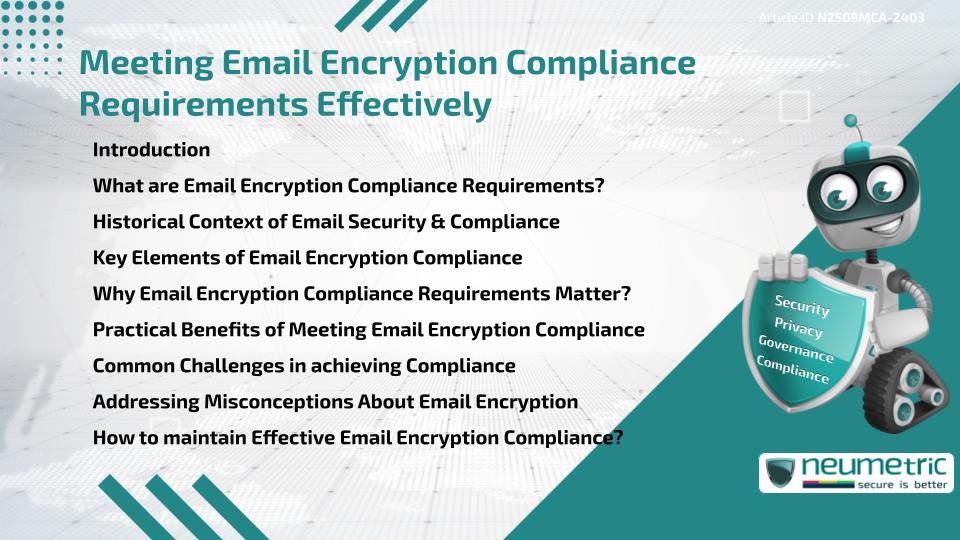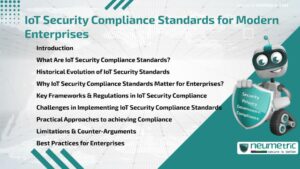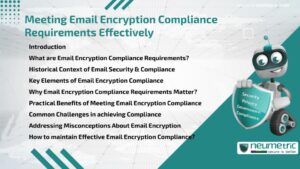Table of Contents
ToggleIntroduction
Meeting Email Encryption Compliance Requirements is essential for Organisations that handle sensitive or regulated information. Regulatory frameworks such as HIPAA, GDPR & PCI DSS mandate the protection of Personal & Financial data shared via email. Compliance with these requirements not only safeguards information but also demonstrates Accountability to Regulators, Clients & Partners. Without proper Email Encryption, Organisations Risk data breaches, penalties & loss of trust.
What are Email Encryption Compliance Requirements?
Email encryption Compliance Requirements are regulations & standards that dictate how Organisations must protect Sensitive Data transmitted via email. Encryption ensures that only authorised recipients can access email content, reducing the Risk of unauthorised disclosures. Compliance requires Organisations to implement Encryption protocols, document Security Practices & Monitor ongoing adherence to relevant laws.
Historical Context of Email Security & Compliance
In the early days of email communication, messages were sent in plain text, making them vulnerable to interception. As Cyber Threats increased & Privacy regulations evolved, Email Encryption became a necessity. The introduction of protocols such as TLS [Transport Layer Security] & S/MIME [Secure/Multipurpose Internet Mail Extensions] provided technical foundations. Over time, Regulatory frameworks began requiring encryption to ensure Sensitive Data could be transmitted securely across digital networks.
Key Elements of Email Encryption Compliance
Meeting Compliance Requirements typically involves:
- Using strong encryption protocols (such as TLS, S/MIME, PGP)
- Defining Policies for encrypting sensitive communications
- Ensuring encryption keys are securely managed
- Monitoring & auditing encrypted communications
- Training Employees to recognise when & how to use Encryption tools
These elements ensure both regulatory adherence & practical Data Protection.
Why Email Encryption Compliance Requirements Matter?
Compliance matters for several reasons:
- Protects Sensitive Information such as Health, Financial or Personal Data
- Meets Regulatory obligations & reduces Legal liability
- Builds Trust with Clients, Partners & Regulators
- Reduces the Risk of Data Breaches & Reputational harmFor example, a Healthcare provider sending Patient Data must comply with HIPAA. Email Encryption ensures that Personal Health Information is secured against unauthorised access.
Practical Benefits of Meeting Email Encryption Compliance
Organisations that meet Compliance Requirements experience multiple benefits:
- Reduced exposure to Regulatory penalties
- Enhanced security for business-critical communications
- Stronger reputation for safeguarding Client & Partner information
- Greater operational efficiency through standardised processes
This is not only about satisfying regulations but also about creating a culture of responsible Data Management.
Common Challenges in achieving Compliance
Organisations may struggle with:
- Complexity of Encryption technologies
- Integration with existing email systems
- Balancing usability with security
- Ensuring consistent Employee Awareness & Training
These challenges can be overcome through proper planning, user-friendly tools & ongoing education.
Addressing Misconceptions About Email Encryption
A common misconception is that Encryption slows down email systems or complicates communications. In reality, modern Encryption solutions are designed for seamless integration. Another myth is that compliance is achieved by enabling Encryption once. True compliance requires Continuous Monitoring, updating Policies & adapting to Regulatory changes.
How to maintain Effective Email Encryption Compliance?
Maintaining compliance involves:
- Regularly reviewing & updating Encryption Policies
- Conducting internal Audits & Risk Assessments
- Keeping Encryption technologies up to date
- Providing ongoing staff training on Compliance Requirements
Like Financial Audits, Encryption Compliance must be a continuous, repeatable process that evolves with technology & regulations.
Takeaways
- Email encryption Compliance Requirements safeguard Sensitive Data & ensure Regulatory adherence
- They help Organisations build Trust & reduce Legal & Reputational Risks
- Ongoing Monitoring, Training & Policy updates are key to effective Compliance
- Meeting requirements fosters both Operational Efficiency & Accountability
FAQ
What are Email Encryption Compliance Requirements?
They are regulations & standards requiring Organisations to Encrypt Sensitive Data transmitted via email to prevent unauthorised access.
Which regulations require Email Encryption?
Examples include HIPAA for Healthcare, GDPR for Privacy in the EU & PCI DSS for Financial Data Security.
Does using TLS alone meet Compliance Requirements?
TLS is important but may not be sufficient. Many regulations require end-to-end Encryption & additional safeguards.
Is Email Encryption difficult for Employees to use?
Modern solutions are designed to be user-friendly & integrate with existing email platforms.
How often should encryption Policies be reviewed?
At least annually or whenever there are major changes in Regulations, technology or Business Operations.
Can Small Businesses meet Email Encryption Compliance Requirements?
Yes, scalable encryption tools allow small & medium enterprises to comply effectively without significant resource strain.
Need help for Security, Privacy, Governance & VAPT?
Neumetric provides organisations the necessary help to achieve their Cybersecurity, Compliance, Governance, Privacy, Certifications & Pentesting needs.
Organisations & Businesses, specifically those which provide SaaS & AI Solutions in the Fintech, BFSI & other regulated sectors, usually need a Cybersecurity Partner for meeting & maintaining the ongoing Security & Privacy needs & requirements of their Enterprise Clients & Privacy conscious Customers.
SOC 2, ISO 27001, ISO 42001, NIST, HIPAA, HECVAT, EU GDPR are some of the Frameworks that are served by Fusion – a SaaS, multimodular, multitenant, centralised, automated, Cybersecurity & Compliance Management system.
Neumetric also provides Expert Services for technical security which covers VAPT for Web Applications, APIs, iOS & Android Mobile Apps, Security Testing for AWS & other Cloud Environments & Cloud Infrastructure & other similar scopes.
Reach out to us by Email or filling out the Contact Form…





